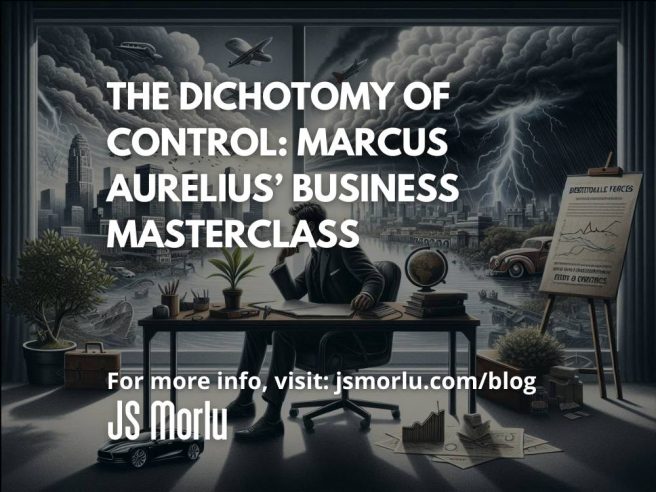By: John S. Morlu II, CPA
What You Really Control (Spoiler: Almost Nothing)
Marcus Aurelius, the philosopher-emperor, lived surrounded by war, betrayal, plague, and politics. His empire was under siege, his own generals plotted against him, and even those closest to him were not always loyal. Yet his most practical lesson is deceptively simple: you control almost nothing.
Your sphere of control is shockingly small — your judgment, your desires, your choices, and your responses to events. That’s it. Everything else? Out of your hands.
- Your reputation: a fragile thing that belongs to other people’s gossip and perception. You may act with integrity, but how others spin your name is never yours to dictate.
- Your health: partly in your hands — yes, through diet, exercise, and discipline — but ultimately genetics, accidents, and time hold the veto. Even the most disciplined athlete can be struck down by illness.
- The outcome of your efforts: never guaranteed, only influenced. You can work hard, prepare brilliantly, and still watch someone else get the contract or the recognition.
- Your first thoughts and emotions: they arrive without permission, like uninvited guests. Anger, jealousy, fear — they come. What you control is the door policy after they arrive: do you host them, or send them packing?
- Who betrays you: you cannot control who will decide to stab you in the back, who will abuse your trust, or who secretly believes they have played you for a fool. That decision is theirs, not yours. The only control you have is your response — whether you allow bitterness to consume you, or you rise above and keep moving forward.
This honesty is liberating — but only if you’re willing to stop pretending you’re the master of outcomes. The Stoics weren’t pessimists; they were realists. They freed themselves from false ownership of things that never belonged to them in the first place.
📜 Historical Example: Socrates was sentenced to death in Athens not because of what he controlled, but because of public opinion and politics. He couldn’t control the verdict, but he could control his response — calm acceptance, reasoning with his followers, and teaching until the end. That final choice still echoes thousands of years later.
📱 Modern Example: Steve Jobs couldn’t control whether customers would love the iPhone at launch. He couldn’t control the market’s unpredictable appetite for change. But he could control design obsessiveness, product vision, and presentation quality. Those inputs — not guarantees — eventually created an outcome no one could command with certainty: a global revolution in communication.
Inputs vs. Outcomes: The Business Example
In business, this principle saves leaders from madness. You cannot control whether your company succeeds. The market may collapse. A global pandemic may arrive. A competitor may undercut your price overnight. An investor may change their mind at the eleventh hour. And yes — a trusted partner may betray you at the worst possible moment.
But you can control the inputs:
- How thoroughly you research your market before launching — not falling in love with your idea, but ruthlessly testing it against reality.
- How carefully you manage cash flow instead of inflating expenses to look impressive. Cash is oxygen. Burn it too fast, and no market rescue will save you.
- Who you hire and keep on payroll — whether you bring on culture builders who raise standards, or parasites who drain them. You can’t control if a loyal employee later betrays you, but you can control how carefully you select them in the first place.
- How professionally you serve customers, whether they buy today or never buy at all. Respect builds trust, even when revenue lags.
🌱 It’s farming, not magic. You don’t command the rain, but you can plant good seed, water diligently, and keep weeds at bay. Farmers don’t scream at the sky; they master the soil.
📊 Case Study: Jeff Bezos could not control whether Wall Street would believe in Amazon during its unprofitable years. Many laughed at him. He didn’t control the laughter, but he controlled his inputs: relentless customer obsession, disciplined logistics, long-term strategy. Those inputs eventually tipped the scales — Amazon became indispensable, not by controlling outcomes, but by perfecting inputs.
The Satirical Workplace Edition
Modern companies are laboratories of self-deception. People act as if outcomes are theirs to command — until reality smacks them across the face.
- Sales teams: “The client is very interested!” Translation: they smiled politely on Zoom before muting themselves. Control? Zero.
- Product teams: Hide the fact that the software crashes whenever you click “Reports” — right before the big investor demo. The input (telling the truth) was in their control; the outcome (whether investors walk away) was never theirs to dictate.
- HR departments: Withhold the fact that three employees quit last week, preferring to “bundle it into next month’s attrition report.” Congratulations — leadership is now blindfolded with a smiley face sticker.
- Colleagues: Pretend to support you in meetings while quietly undermining you in the hallway. You can’t control their betrayal, but you can control your vigilance and the culture you tolerate.
This is the difference between protecting your boss and sabotaging them. Withholding bad news isn’t control; it’s cowardice disguised as optimism.
🚨 Case Study: Boeing’s 737 MAX crisis is a textbook input/output disaster. Engineers and managers controlled design choices and reporting honesty. Instead, they tried to control outcomes — faster approvals, happy investors, smoother headlines — by hiding flaws. The result? Billions lost, global trust destroyed, and a reputation in ruins.
Why This Matters for Leaders
Most leadership stress comes from trying to control the uncontrollable. Leaders waste enormous energy on:
- The stock market (news flash: they don’t care about your quarterly pep talk).
- Customers’ moods (they can love you today and ghost you tomorrow without explanation).
- Employee loyalty (people will jump ship for $200 more, free lunch, or a fancy coffee machine).
- Betrayal (no matter how generous you are, some people will misuse your kindness, mistake your trust for weakness, and convince themselves they’ve played you for a fool).
Marcus Aurelius reminds us: control the inputs. That’s where character, discipline, and excellence actually live.
- You can’t control whether an employee leaves, but you can control whether you gave them clarity, fair pay, and respect.
- You can’t control whether a product becomes a hit, but you can control whether it was built with care, tested with rigor, and marketed with honesty.
• You can’t control whether a crisis arrives, but you can control whether your team is trained, your systems resilient, and your mindset steady.
• You can’t control whether people betray you, but you can control whether you let betrayal define you, or whether you keep building anyway.
📜 Historical Example: During World War II, Winston Churchill couldn’t control whether Nazi bombs would fall on London. But he controlled his response — stirring speeches, unshakable resolve, and preparation for survival. The outcome (victory) wasn’t guaranteed, but the inputs were non-negotiable.
🚀 Modern Example: Elon Musk couldn’t control whether Tesla stock would skyrocket or collapse. The market is emotional, irrational, and unpredictable. What he did control: bold engineering bets, brutal cost-cutting, and constant innovation. The judgment of Wall Street came later.
The Brutal Freedom of Stoicism
Here’s the paradox: when you stop obsessing about outcomes, you perform better. Why? Because all your energy shifts to what’s actually in your hands — preparation, execution, and judgment.
Marcus Aurelius faced plagues, betrayals, and invading armies. He didn’t waste time shouting at the gods. Instead, he asked: “What is within my control right now?” His answer was always the same: reasoned judgment, disciplined action, and composure in chaos.
For entrepreneurs and leaders today, the lesson is identical. Focus on what you can control — inputs, integrity, effort — and let outcomes fall where they may.
Because in the end, clinging to control of the uncontrollable is like yelling at the weather. Better to carry an umbrella and keep walking.
🎬 Case Study: Netflix couldn’t control whether Blockbuster would laugh them out of the room (they did). But Reed Hastings controlled the pivot from DVDs to streaming. That single input decision reshaped the entertainment industry forever.
🔥 Final Word: The dichotomy of control isn’t just philosophy — it’s a survival skill for modern leaders. If you waste your life trying to control outcomes, betrayals, or other people’s opinions, you’ll burn out. If you master the inputs, you’ll build something that can outlast even the storms — and even the traitors.
Author: John S. Morlu II, CPA is the CEO and Chief Strategist of JS Morlu, leads a globally recognized public accounting and management consultancy firm. Under his visionary leadership, JS Morlu has become a pioneer in developing cutting-edge technologies across B2B, B2C, P2P, and B2G verticals. The firm’s groundbreaking innovations include AI-powered reconciliation software (ReckSoft.com) and advanced cloud accounting solutions (FinovatePro.com), setting new industry standards for efficiency, accuracy, and technological excellence.
JS Morlu LLC is a top-tier accounting firm based in Woodbridge, Virginia, with a team of highly experienced and qualified CPAs and business advisors. We are dedicated to providing comprehensive accounting, tax, and business advisory services to clients throughout the Washington, D.C. Metro Area and the surrounding regions. With over a decade of experience, we have cultivated a deep understanding of our clients’ needs and aspirations. We recognize that our clients seek more than just value-added accounting services; they seek a trusted partner who can guide them towards achieving their business goals and personal financial well-being.
Talk to us || What our clients says about us



